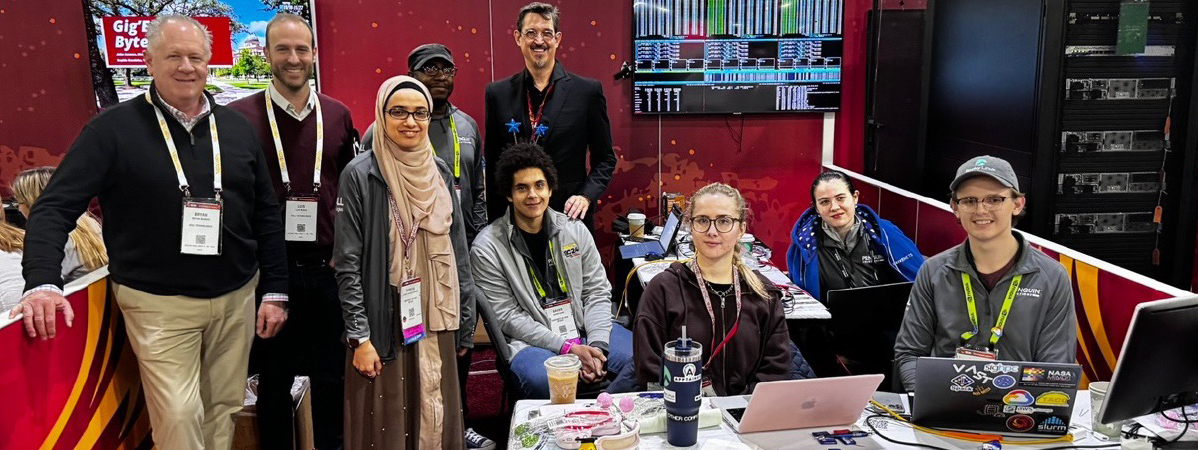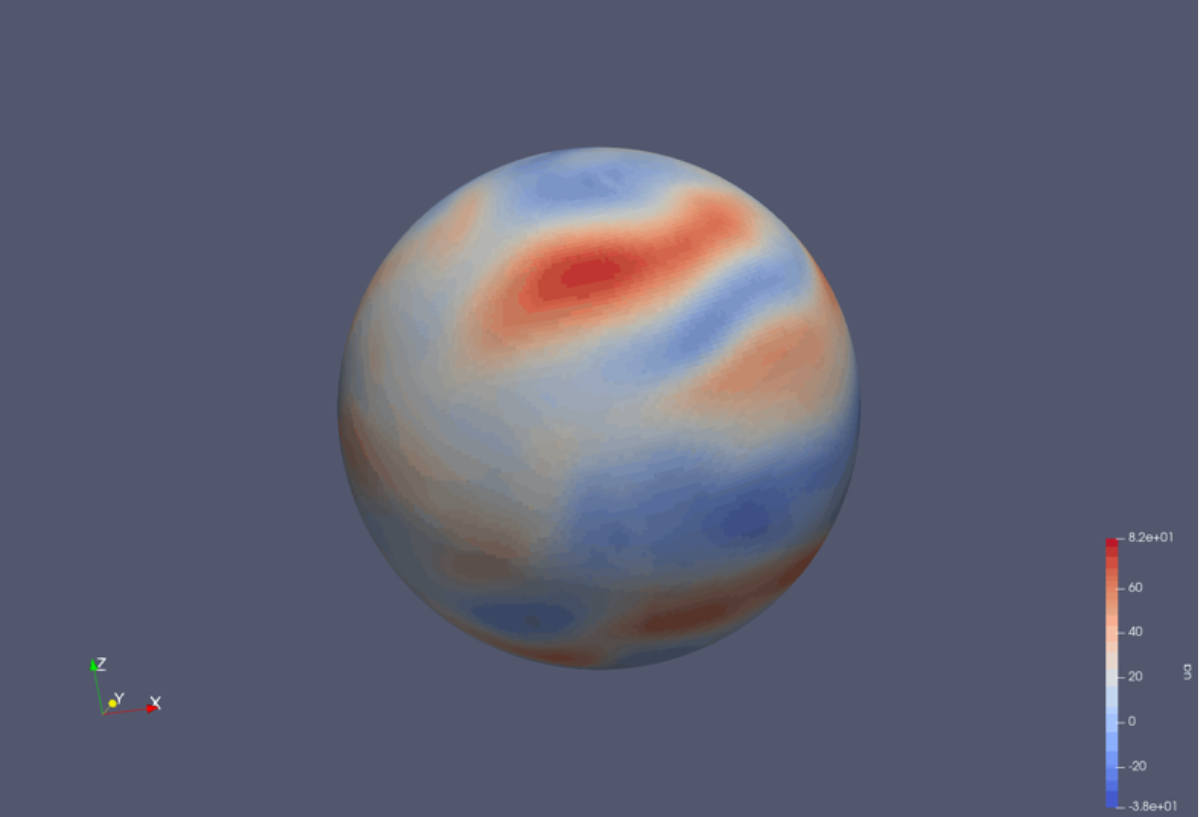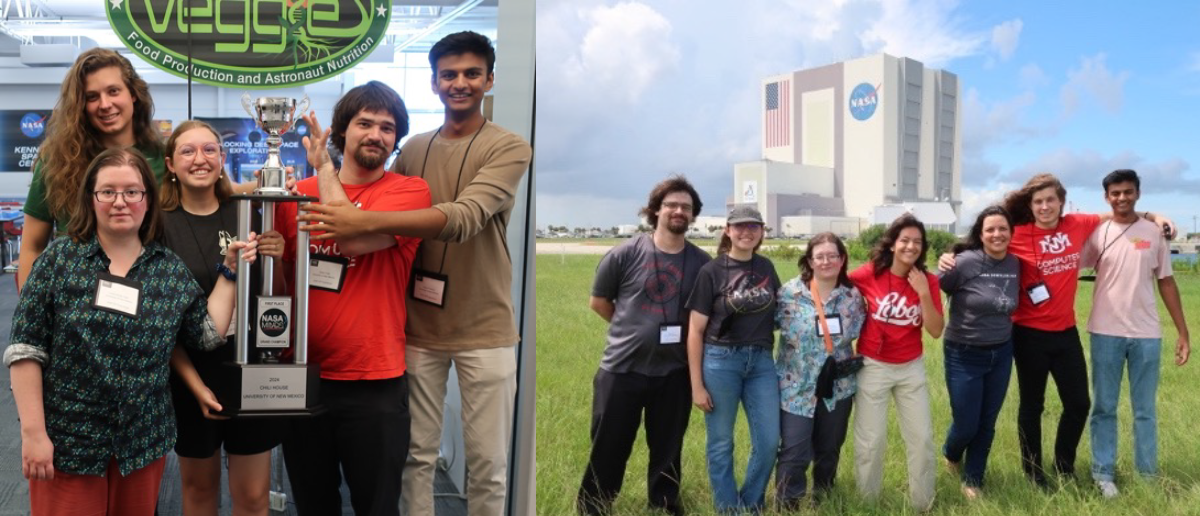Recent News
UNM Engineering names Prabhakar inaugural Cleve Moler and MathWorks Endowed Chair
October 3, 2025
Computer scientist wins Athlete of the Year Award for adaptive skiing technique
May 29, 2025
Hand and Machine Lab wins 2 awards at CHI conference
May 15, 2025
News Archives
Partnering for success: Computer Science students represent UNM in NASA and Supercomputing Competitions
December 11, 2024
By Matthew Fricke
Working with Dell Technologies and NASA, Computer Science undergraduate students from The University of New Mexico achieved recognition in two major competitions. These teams represent UNM’s commitment to preparing New Mexico students for high-tech careers in supercomputing and space technologies.
Roadrunners: Supercomputing Competition

Figure 1. The six-month supercomputing competition culminated in a 48-hour hackathon in Atlanta. From left: Dell representatives Bryan Bianchi (Data Center Account Executive, AI Select) and Luis Marin (Global Account Manager, AI Select), UNM Roadrunner Team: Sumaya Houssini Mohamed (CS), Maurice Ransby, Matthew Fricke (faculty mentor), Saskia Trefethen (CS), Molly Palko (CS) and Ryan Scherbarth (CS, team lead).
In November, the UNM Roadrunner team participated in the International Student Cluster Competition at Supercomputing 2024 in Atlanta. The team was privileged to compete against some of the most highly ranked universities in the world, earning second place among U.S. teams and eighth overall. The Roadrunner team exemplifies New Mexico’s history of technological innovation and diversity. The team is proud to include members from groups historically underrepresented in supercomputing.

Figure 2. Global climate model produced during the hackathon by Saskia Trefethen on the Roadrunner team.
Industry partnership was critical to the Roadrunner’s success. They were fortunate to be sponsored by Dell Technologies which provided a supercomputer for use during the competition, allowing the team to work with state-of-the-art hardware. Penguin Solutions and Intersect360 Research continued their support of the team this year, helping with all other costs associated with the competition, including transportation to the conference, meals, and other expenses. With these strong partnerships and their own technical expertise, the Roadrunner team is already preparing to compete again in 2025, aiming to improve their performance.
The team was coached by Troy Redfearn (Center for Advanced Research Computing), Alexandra Knigge (Center for Advanced Research Computing), and Nicholas Bacon (Ph.D. student in the Scalable Systems Lab). Research Associate Professor Matthew Fricke supervised the team.
Though several members of the team are graduating, Fricke is already forming a new team for 2025.
Chili House: NASA MINDS Competition – Kennedy Space Center

Figure 3. Chili House team members at Kennedy Space Center to accept the grand prize. (Right picture) From left: Carter Frost (CS), Trinity Griffus (Biology, team lead), Tatyana Falkowsky (Biochemistry), Stefany Olivas (Biology), Andrei Popa-Simil (CS), and Shrey Poshiya (CS).
In August, the NASA Chili House team won the grand prize in the 2024 NASA MINDS (MUREP Innovative New Designs for Space) competition, marking their second grand prize since their win in 2021.
NASA MINDS challenges university teams to create solutions that support NASA’s Artemis program and future space exploration. The Chili House team repurposed a broken and discarded 3D printer into a robotic gardener capable of autonomously tending crops such as Hatch green chilis. Sensors attached to the crop let the system know when the plants need attention. Robotic farming, such as the solution demonstrated by the students, is crucial for long term missions on space stations, and colonization of the Moon, Mars, and beyond. NASA astronauts have expressed a preference for spicy foods, including New Mexico chilis during long-duration missions, as microgravity dulls the sense of taste. This initiative aims to not just enhance the flavor of meals but also contribute to the psychological well-being of astronauts by providing live plants that instill a sense of normalcy and a connection to the Earth.
In August the Chili House team travelled to Kennedy Space Center where they attended the NASA MINDS award ceremony and presented their work to NASA engineers and researchers. They plan to compete again in 2025, building on their success and further developing the robotic gardening system. The team’s work also underscores the importance of space colonization, which offers opportunities for exploration, technological advancement, and solutions to global challenges such as food security.
The Chili House team is a collaboration between several UNM departments: Trinity Griffus (team lead) and Louis Shogo Hight are from Biology, Shrey Poshiya, Carter Frost, and Andrei Popa-Simil from Computer Science, Tatyana Falkowsky and Pascale Allred from Biochemistry, and Sabrina Falkowsky from Economics. The Chili House NASA team was advised by Professor and Assistant Vice President for Research David Hanson and Dr. Fricke in the Moses Biological Computation Lab, supported by Laura Green (Biology) and Jacob “Pepperseed” Torres (Moon Chile Challenge).
"The students I get to work with at UNM continually amaze me with their dedication, perseverance, and talent. They are the driving force behind New Mexico’s bright future in high technology – I am so proud of the students on both teams,” Fricke said.
The Roadrunner and Chili House teams demonstrate the value of hands-on experience in preparing students for high-tech careers. They embody UNM’s mission to equip graduates to address critical global issues. From advancing applications supercomputing in climate science, vaccine development, and AI to creating sustainable technologies for space exploration, these UNM students continue to push the boundaries of innovation and excellence.
